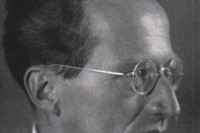Summary
In Hinduism there is a word, mahavit, for someone who has learnt the theory of a religion but hasn't yet applied it to the practice of his daily life. Whether its usual connotation is more like "cautious observer" or "slouchy dilletante", I don't know enough to say, but either way, inherent in it is a slight tension. If you believe, then why not live as if you believe? And if you don't believe, then why waste all that time in study? There are so many other systems of thought that you could have been investigating. Or, alternatively, there are still Hitchcock films you haven't seen. Regardless, two great mahavits died on this date – the poet TS Eliot and the physicist Erwin Schrodinger – who both seemed almost to transcend that status.
Eliot studied Eastern religions in detail at Harvard, learning some Sanskrit and some Pali, and soon concluded that "their subtleties make most of the great European philosophers look like schoolboys." For a young man disillusioned with his banal surroundings and desperate to break away from his family, there was something wonderfully aloof, impersonal and invulnerable about the Buddhist notion of the spirit, free of all attachments and desires. And by the time he was composing The Wasteland, which ends, of course, with the chant "Shantih shantih shantih," he was genuinely considering a conversion to Buddhism. But the truth was, he wrote, "my only hope of really penetrating to the heart of that mystery would lie in forgetting how to think and feel as an American or European: which for practical as well as sentimental reasons, I did not wish to do."
Schrodinger seems to have had the same problem. Nothing, for instance, could convince him of the transmigration of souls. Nonetheless: today, if somebody tries to invoke quantum physics to shore up their belief in homeopathy or astrology or psychic kittens or whatever it may be, then one mentally stamps a big CHARLATAN on their forehead, because nobody without a PhD really understands enough about quantum physics to use it in that sort of context. But the fact is that even for Schrodinger – who had an open marriage, by the way, lest one be tempted to think of him as an arid geek – there was some overlap between science and mysticism. The Vedantic belief that everything that happens is part of a single great consciousness was quite consistent with the empirical model of a universe based on inseparable, superimposed waves of probability amplitudes. Whatever Eliot and Schrodinger's reasons for holding back, one ought to observe that even the most unlikely person can upgrade from mahavit if they really want to. When Christopher Isherwood, who also died on this date, first came to Los Angeles, he had no time for religion: "The Christians I saw as sour life-haters and sex-forbidders, hyprocritically denying their rabid secret lusts. The Hindus I saw as stridently emotional mystery mongers whose mumbo jumbo was ridiculous rather than sinister." And even worse, when he did meet Ramakrishna, who would eventually become his lifelong guru, he was told that chastity was essential to Vedanta. Chastity, for one of the twentieth century's great connoisseurs of young men! But he managed it. Perhaps if Schrodinger and Eliot had been breathing that scented California air, they would have too.
Ned Beauman used to be Commissioning Editor at Another Man, writes often for Dazed & Confused and has contributed to the Guardian, the Financial Times, and many other publications. His debut novel Boxer, Beetle will be published by Sceptre in August 2010



